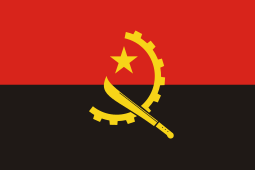Languages of Angola
| Languages of Angola | |
|---|---|
| Official languages | Portuguese |
| National languages | All recognized languages of Angola are "national languages" |
| Main foreign languages | English, French |
| Part of a series on the |
| Culture of Angola |
|---|
 |
| History |
| People |
| Languages |
| Cuisine |
| Religion |
| Literature |
|
Music and performing arts |
| Sport |
|
Symbols |
|
The languages of Angola are predominantly Bantu and Portuguese, with a small minority of !Kung and Khoe speakers. About 39 languages are spoken in Angola.[1]
European languages
Portuguese is the sole official language. Due to cultural, social and political mechanisms which date back to the colonial history, the number of native Portuguese speakers is large and growing.[2] A 2012 study by the Angolan National Institute for Statistics found that Portuguese is the mother tongue of 39% of the population.[1][3] It is spoken as a second language by many more throughout the country, and younger urban generations are moving towards the dominant or exclusive use of Portuguese. A 2014 study found that about 71% of the nearly 25.8 million inhabitants of Angola speak Portuguese.[4][5][6][7]
In urban areas, 85% of the population speaks Portuguese, against 49% in rural areas.[6] Portuguese was quickly adopted by Angolans in mid-twentieth century as a lingua franca among the various ethnic groups. After the Angolan Civil War, many people moved to the cities where they learned Portuguese. When they returned to the countryside, more people were speaking Portuguese as a first language. The variant of the Portuguese language used in Angola is known as Angolan Portuguese. Phonetically, this variant is very similar to the Brazilian variant with some notable exceptions.[8] In some respects, Angolan Portuguese resembles that of a pidgin.[9]
However, in Cabinda, wedged between two French-speaking countries — the DRC and the Congo — many people speak French as well as, or better than, Portuguese. In fact, of the literate population, 90 percent speak French while 10 percent speak Portuguese.[10] Also, the Angolan Bakongo who were exiled in the Democratic Republic of the Congo usually speak better French and Lingala than Portuguese and Kikongo.[1]
Africans from Mali, Nigeria, and Senegal speak English or French and their native African languages and are usually learning at least some Portuguese. The foreign language mostly learned by Angolans is English, but among the Bakongo (in the Northwest and Cabinda) French is often more important. English will soon be a required subject in Angolan schools. French used to be required as an elective, but it is no longer mandatory.[11]
African languages
All native languages of Angola are considered to be national languages. After independence, the government said it would choose six to be developed as literary languages. The six languages vary between government pronouncements, but commonly included are Umbundu, Kimbundu, Kikongo (presumably the Fiote of Cabinda), Chokwe, Kwanyama, and Ganguela (never clearly defined; may be Nyemba, Luchazi, or indeterminate).[12][13] Angolan radio transmits in fourteen of the "main" national languages: Bangala, Cokwe, Fiote, Helelo, Kikongo, Kimbundu, Kwanyama, Lunda, Ngangela, Ngoya, Nyaneka, Oxiwambo, Songo, Umbundu.[14] Some of the national languages are used in Angolan schools, including the provision of teaching materials such as books, but there is a shortage of teachers.[6]
Umbundu is the most populous Bantu language, spoken natively by about 23 percent of the population, about 5.9 million. It is mainly spoken in the center and south of the country.[6] Kimbundu is spoken in Luanda Province and adjacent provinces. Kikongo is spoken in the northwest, including the exclave of Cabinda.[15] About 8.24% of Angolans use Kikongo. Fiote is spoken by about 2.9%, mainly in Cabinda.[6]
The San people speak languages from two families, the !Kung and Khoe, though only a few hundred speak the latter. The majority of San fled to South Africa after the end of the civil war. The extinct Kwadi language may have been distantly related to Khoe, and Kwisi is entirely unknown; their speakers were neither Khoisan nor Bantu.[16]
Asian languages
A (very small) number of Angolans of Lebanese descent speak Arabic and/or French. Due to increasing Angola-China relations, there is now a Chinese community of about 300,000 speaking Chinese.[17]
See also
External links
- PanAfrican L10n page on Angola
- L'aménagement linguistique dans le monde - Angola
- Ethnologue Listing of Angolan Languages
References
- 1 2 3 Angola Ethnologue
- ↑ During late colonialism, 1962-1975, when all Angolans were considered as Portuguese citizens with equal rights, many black middle class families in the cities refused to teach their children native languages, so that they could compete with the whites, speaking Portuguese the same way.
- ↑ http://poing.me/layar/Colombia/brochuranoCrop.pdf
- ↑ "População de Angola sobe para mais de 25,7 milhões de pessoas". Dinheiro Digital. Retrieved 2016-05-26.
- ↑ "Entre os de 1ª e os de 2ª já somos mais de 25,7 milhões". Folha 8. Retrieved 2016-05-26.
- 1 2 3 4 5 "Angola: português é falado por 71,15% de angolanos". Observatório da Língua Portuguesa. Retrieved 2016-03-30.
- ↑ "Quantos falantes de português existem?". DicionarioeGramatica.com. Retrieved 2016-02-21.
- ↑ Clavis Prophetarum. "Da situação da língua portuguesa em Angola". MOVV.org. Retrieved 26 October 2016.
- ↑ Portuguese language in Angola: luso-creoles' missing link? John M. Lipski
- ↑ Global Security. Military. Cabinda
- ↑ "In Angola, Education Ministry Aims to Expand Teaching of English". Voice of America. 28 April 2008. Retrieved 26 October 2016.
- ↑ Resolution adopted by Council of Ministers - Official Gazette No. 3/87 of May 1987
- ↑ Angola Harmonização das línguas bantu dificultada pela fonética e grafia
- ↑ Rádio N’Gola Yetu
- ↑ Angola: Language Situation (2005). Keith Brown, ed. Encyclopedia of Language and Linguistics (2 ed.). Elsevier. ISBN 0-08-044299-4.
- ↑ Matthias Brenzinger, 1992. Language death: factual and theoretical explorations with special reference to East Africa, p. 367.
- ↑ Picture shows a railway sign in Portuguese and Chinese